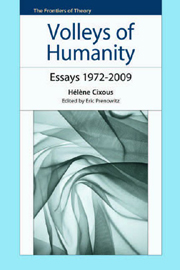Book contents
- Frontmatter
- Contents
- Sources
- Series Editor's Preface
- Introduction: Cixousian Gambols
- 1 Fiction and Its Phantoms: A Reading of Freud's Das Unheimliche (The ‘Uncanny’)
- 2 The Character of ‘Character’
- 3 Missexuality: Where Come I Play?
- 4 The Pleasure Reinciple or Paradox Lost
- 5 Reaching the Point of Wheat, or A Portrait of the Artist as a Maturing Woman
- 6 Letter to Zohra Drif
- 7 The Names of Oran
- 8 The Book as One of Its Own Characters
- 9 How Not to Speak of Algeria
- 10 The Oklahoma Nature Theater Is Recruiting
- 11 The Book I Don't Write
- 12 The Unforeseeable
- 13 Passion Michel Foucault
- 14 Promised Cities
- 15 Volleys of Humanity
- Acknowledgements
- Index
13 - Passion Michel Foucault
Published online by Cambridge University Press: 12 September 2012
- Frontmatter
- Contents
- Sources
- Series Editor's Preface
- Introduction: Cixousian Gambols
- 1 Fiction and Its Phantoms: A Reading of Freud's Das Unheimliche (The ‘Uncanny’)
- 2 The Character of ‘Character’
- 3 Missexuality: Where Come I Play?
- 4 The Pleasure Reinciple or Paradox Lost
- 5 Reaching the Point of Wheat, or A Portrait of the Artist as a Maturing Woman
- 6 Letter to Zohra Drif
- 7 The Names of Oran
- 8 The Book as One of Its Own Characters
- 9 How Not to Speak of Algeria
- 10 The Oklahoma Nature Theater Is Recruiting
- 11 The Book I Don't Write
- 12 The Unforeseeable
- 13 Passion Michel Foucault
- 14 Promised Cities
- 15 Volleys of Humanity
- Acknowledgements
- Index
Summary
On 29 June 1984, the day of the last scene, I cried floods of tears. It was the day of his burial. I see myself outside in a crowd I do not see, he is inside. I am waiting for him to come out. Now he is coming out. What I see of him: his last form. What appears is a body of light-coloured wood. His last costume. On seeing the coffin a part of my heart cracked. Floods of tears burst forth. Would I say I was ashamed? I was undoubtedly the only one in that mourning crowd to cry in torrents, without being able to stop. I saw nothing through the storm of tears, save the stiffened body of clear-coloured wood. And on this body of wood, strange hair of veiled roses. I know those tears well. They are the ones that carry off my soul each time the being that most violently tears apart my heart appears on the stage of the world, and this being is: the marionette. What afflicted me and transported me was not only the feeling of irreparable loss. It was the exact and sublime vision of the whole being and the whole history of Michel in that ultimate figure: the powerlessness of power. Thus he went in the form of the imprisoned and detached soul. A résumé of himself.
Act-Suffer [Agir-Pâtir]. I acted a great deal with Michel Foucault, I played with him, seriously played at the theatre of life. We were characters and spectators in a play that always exceeded us. We knew we were enclosed, and we searched for the exits, each of us in our own way. I shall evoke a few epiphanic scenes, in the story that led our friendship from the year 1968 to the last scene.
- Type
- Chapter
- Information
- Volleys of HumanityEssays 1972–2009, pp. 241 - 246Publisher: Edinburgh University PressPrint publication year: 2011



